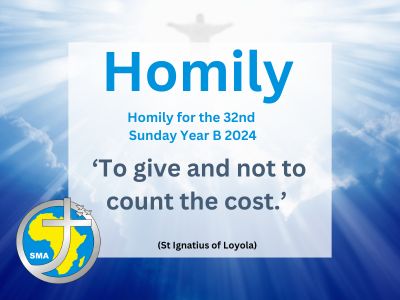Readings: 1 Kings 17:10-16; Hebrews 9:24-28; Mark 12: 38-44.
Theme: ‘To give and not to count the cost.’ (St Ignatius of Loyola).
Widows feature prominently in the Bible. Today’s readings showcase two widows of extraordinary generosity. We must remember that, in biblical times, widows were not only poor, but also without security. They were the most marginal of the marginalised and hence extremely vulnerable. On the death of their husbands, they had lost their only means of livelihood and had to depend totally on charity to survive.
Our first reading, from the first Book of Kings, recounts a memorable incident in the life of Elijah, one of the great prophets of Israel who lived 900 years before Christ. During a severe famine he enters a foreign town, Sidon (in modern day Lebanon), where he meets a widow gathering sticks. This woman is preparing to cook a final meal for herself and her son before both of them expire. Notwithstanding her harrowing circumstances, Elijah asks her for water and some bread, assuring her that she and her son will not starve to death. Despite not being a Jew, she trusts his promise and shares her final meal with him. The story has a happy ending as we are told that ‘the jar of meal was not spent nor the jug of oil emptied’ (1Kgs 17:16).
In the gospel passage from Mark, we meet another widow, also in dire straits. She has just two small coins left in her purse, the equivalent of a penny, about 1% of a labourer’s daily way. In an act of seemingly reckless generosity she puts both coins into one of the boxes of the Temple treasury. Jesus alone notices her and immortalises her act of self-less giving. And he presents her to his disciples as a model of generosity, saying: ‘I tell you solemnly, this poor widow has put more in than all who have contributed to the treasury; for they have put in money they had over, but she from the little she had has put in everything she possessed, all she had to live on’ (Mk 12:43-44).
The discrete, unselfconscious, action of the widow stands in stark contrast to the self-important posturing of the scribes. They love ‘to walk about in long robes’ in order to be noticed and ‘greeted obsequiously in the market squares’ (Mk 12:38). Jesus warns his disciples to beware of these hypocrites who, while pretending to be holy men of prayer, ‘swallow the property of widows’ (Mk 12:40). In other words, they use their position as lawyers to exploit vulnerable widows for their own advantage. A more despicable injustice would be hard to imagine!
Taken literally the actions of the two widows appear reckless and foolish, for they give, not from their abundance, but all the meagre means they have for survival. Yet their incredible generosity illustrates a profound truth about God and about us. The widows epitomise God’s self-giving love, and it is when we give freely and without counting the cost that we are most like God. The poet Brendan Kennelly has a beautiful poem in which he sees God’s constant giving of himself reflected in nature, particularly at this time of year. I quote a few lines:
‘I give thanks to the giver of images,
The reticent God who goes about his work
Determined to hold on to nothing.
Embarrassed at the prospect of possession,
He distributes leaves to the wind
And lets them pitch and leap like boys
Capering out of their skin.
Pictures are thrown behind hedges,
Poems skitter backwards over cliffs.
Jesus is the one who manifests supremely the Creator God who gives everything away. He does this in his ministry to the poor and marginalised, but above all in his passion and death on the Cross. The widow whose selfless act of generosity touched the heart of Jesus prefigures his own great act of self-giving love soon to be accomplished on the hill of Calvary. By this act he sacrificed himself, as our Second reading from the Letter to the Hebrews reminds us, ‘to do away with sin once and for all’ (Heb 9:26) and so became the great High Priest of our Faith.
We too are challenged to imitate the generosity of the widows who gave away all they had to live on, and to become sacraments of God’s self-giving love in a world increasingly preoccupied with possession and security. Let us be givers and not just consumers. I end with a reflection from the pen of Kahlil Gibran that sums up the message of today’s readings:
There are those who give little of the much which they have–and they give it for recognition, and their hidden desire makes their gifts unwholesome.
And there are those who have little and give it all.
These are the believers in life and the bounty of life,
and their coffer is never empty.
There are those who give with joy, and that joy is their reward.
And there are those who give with pain, and that pain is their baptism.
And there are those who give and know not pain in giving, nor do they seek joy, nor give with mindfulness of virtue.
They give as in yonder valley the myrtle breathes its fragrance into space.
Through the hands of such as these God speaks, and from behind their eyes He smiles upon the earth.’
Listen to alternative audio Homily:

